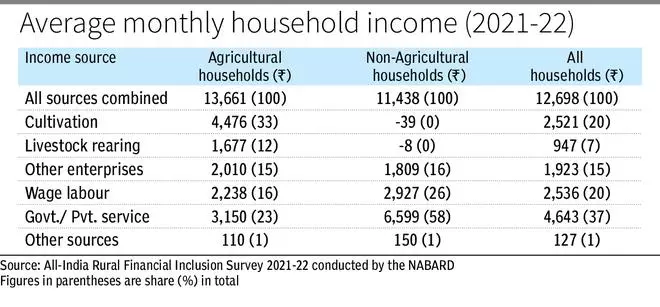Dr. Manmohan Singh’s forward-looking approach to agriculture must not be forgotten. In his speech at the 57th meeting of the National Development Council (NDC) in 2012, he said: “Paradoxically, we should not aim at increasing total employment in agriculture. In fact, we need to move people out of agriculture by providing them gainful employment in the non-agricultural sector.”
He argued that the per capita income of farmers would only rise if fewer people were engaged in farming.
The All-India Rural Financial Inclusion Survey 2021-22 conducted by the National Bank for Agriculture and Rural Development (see table) provides insightful data on the economic conditions of agricultural and non-agricultural households in India, reinforcing Dr. Singh’s vision on reducing agricultural employment to enhance farmers’ per capita income.

Nabard survey
The survey shows that agricultural households have an average monthly income of ₹13,661, with 33 per cent coming from cultivation.
This income is supplemented by wage labour and employment in government or private sectors, indicating a reliance on varied income streams.
In contrast, non-agricultural households earn a slightly lower average income of ₹11,438 but benefit significantly from more stable sources, with 58 per cent of their income coming from government or private jobs.
This data supports the idea that reducing the number of people in agriculture could lead to larger land holdings per farmer and improved cultivation efficiency, potentially increasing the income derived from agriculture.
Transitioning agricultural workers into non-agricultural roles could relieve the strain on agricultural resources. Crucially, this shift would align with policies aimed at fostering educational and skill development opportunities.
As Dr Singh indicated, the transition should be accompanied by higher farm incomes, so that the process is not distress-driven. It will then enhance the financial stability of rural households.
Largest reservoir
Upon taking office as Prime Minister, Dr. Singh established the National Commission on Farmers, appointing MS Swaminathan as its head.
Initiated in 2004, the commission was tasked with addressing the challenges within the agricultural sector in India and devising a comprehensive strategy to ensure the economic viability and sustainability of farming. Between December 2004 and October 2006, the commission submitted five reports.
The final report of the National Commission on Farmers highlighted the causes of farmer distress and the increasing instances of farmer suicides, advocating for the implementation of a holistic national policy for farmers.
Panel recommendations
One of the landmark recommendations was to ensure that farmers receive at least 50 per cent more than the cost of production for their crops, a policy often referred to as “minimum support price (MSP) plus 50 per cent”.
This recommendation marked a significant shift in independent India’s agricultural policy, aiming to provide better economic security for farmers.
In 2006, during a visit to the Vidarbha region of Maharashtra, Dr. Singh engaged directly with the community. In response, the UPA government under his leadership introduced the “Agricultural Debt Waiver and Debt Relief Scheme” during 2008-09.
As the largest farm loan waiver of its time, the scheme provided relief exceeding ₹72,000 crore across India. Although such waivers are often viewed as short-term solutions to agrarian distress, at that time, it was considered a significant alleviation of the farmers’ immediate financial burdens.
Likewise, the Rashtriya Krishi Vikas Yojana (RKVY), launched in 2007, targeted achieving a 4 per cent annual growth in agriculture by encouraging States to increase public investment.
To aid small and marginal farmers, the Farm Loan Interest Subvention Scheme lowered borrowing costs.
Dr Singh’s government
increased funding for agricultural research and education fostered the adoption of innovative agricultural techniques and practices.
In his Independence Day speech in 2006, Dr. Singh highlighted the need for fair pricing in agriculture, stating, “We certainly cannot grudge our farmers better incomes when incomes of other sections of society are rising.”
The writer is Assistant Professor, NITTE School of Management, Bengaluru









Leave a Comment